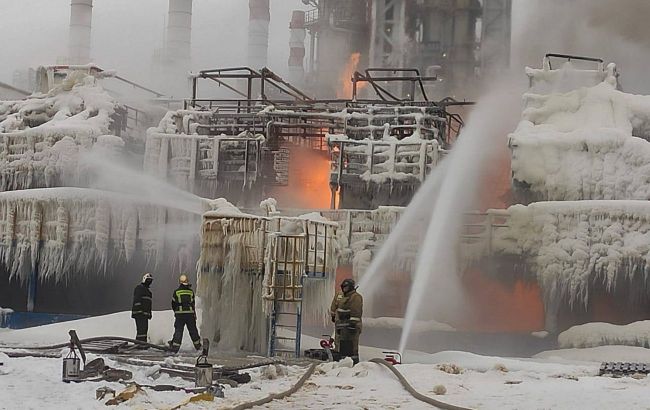Ukrainian drone strikes on Russian refineries serve as Western sanctions replacement - Foreign Affairs
 Photo: Ukrainian drone strikes on refineries replace sanctions (Getty Images)
Photo: Ukrainian drone strikes on refineries replace sanctions (Getty Images)
Ukrainian strikes on Russian refineries are now doing what the Western sanctions regime failed to achieve. One of the world's largest oil producers is now importing gasoline, Foreign Affairs reports.
As noted in the article, since October, Ukraine has launched at least 20 strikes on Russian refineries. Representatives of Ukrainian security services said that the purpose of the attacks was to stop the supply of fuel to the Russian military and reduce export revenues, which the Kremlin uses to finance its military operations.
By the end of March, Ukraine had destroyed about 14% of Russia's refining capacity and forced the Russian government to impose a six-month ban on gasoline exports.
However, President Joe Biden's administration criticized the attacks. In February, Vice President Kamala Harris called on Ukrainian President Volodymyr Zelenskyy to refrain from attacking Russian refineries, fearing that these strikes would lead to higher world oil prices.
In mid-April, Defense Secretary Lloyd Austin warned the Senate Armed Services Committee that attacks could have a knock-on effect in terms of the global energy situation.
However, Washington's criticism is misplaced, the newspaper writes: the refinery attacks will not affect global energy markets, as US officials fear. These strikes reduce Russia's ability to turn its oil into petroleum products; they do not affect the amount of oil the country can produce or export. In fact, with less domestic refining capacity, Russia will be forced to export more of its crude oil, not less, leading to lower, not higher, world prices.
Indeed, Russian companies have started selling more crude oil to foreign countries. As long as they are limited to Russian refineries, the attacks are unlikely to lead to higher oil prices for Western consumers.
However, they could still hurt in Russia, where prices for petroleum products such as gasoline and diesel have begun to rise. The strikes achieve the same goals that Ukraine's Western partners have set out to achieve but have largely failed to do so because of sanctions and price caps on Russian oil: weakening Russia's financial and logistical ability to wage war while limiting broader damage to the global economy.
"Kyiv must take wins where it can, and a campaign to destroy Russia’s oil-refining capacity brings benefits to Ukraine with limited risk," the article says.
Targeted strikes
So far, Ukraine has focused its attacks on Russian refineries, not on oil fields or crude oil export infrastructure. This distinction is important. After oil is produced from a well, it is transported through pipelines and other infrastructure to refineries, where it is transformed into products for distribution to end users.
In 2023, Russia will produce about 10.1 million barrels of oil per day. Of this, about 50% was exported to refineries abroad, and the remaining 50% was refined domestically to create products such as gasoline, diesel, jet fuel, and chemical raw materials. Half of these refined products were consumed domestically, and a significant portion was used to fuel the Russian war machine.
Russia also sells oil products abroad-in 2023, the country accounted for about ten percent of global maritime exports-but most Western countries have already stopped importing refined Russian fuel. The main destinations for Russian oil products are Türkiye, China, and Brazil, although Russia also sells fuel to North Korea in violation of UN sanctions in exchange for munitions.
The Ukrainian strikes have dealt a significant blow to Russia's refining capacity - up to 900,000 barrels per day. Repairs will be slow and expensive, partly because refineries, where oil is distilled into its components, are huge and complex pieces of equipment that take years to design and build, and partly because Western sanctions have made access difficult for Russian firms.
Russia's oil storage capacity is limited. Therefore, when a refinery is destroyed or damaged, the crude oil produced cannot simply be stored for later use. As a result, Russian producers are left with only two options: increase crude oil exports or shut down wells and cut production.
Both options are painful for Russia, but increasing exports is less painful than cutting production. Russia can only sell its oil to selected countries, including China, India, and Türkiye, whose refineries are equipped to use certain grades of oil produced in Russia. Thus, these countries have leverage over Russia, allowing them to purchase products at below-market prices.
If Russia decides to shut down wells instead of increasing exports, the world price of oil will indeed rise, something the Biden administration wants to avoid. But then Russia will face an even sharper increase in the cost of oil products, and lower export revenues will soften the blow. It was therefore not surprising when Russian First Deputy Energy Minister Pavel Sorokin suggested in March that Moscow would choose the first option and send more crude oil for export.
Data from recent months confirm that, as expected, Russia is exporting more crude oil, while its refined fuel exports have reached near historic lows. In the last week of April, Moscow exported just over 712 thousand tons of diesel fuel and gasoline, down from over 844 thousand tons in the same week in 2023.
However, monthly crude oil exports increased by 9% from February to March, reaching their highest level in nine months and the third highest since Western sanctions on Russian crude oil came into effect in December 2022. The strikes did not affect international crude oil prices, which remained stable until the end of March.
Ukrainian strikes on Russian refineries
In 2024, Ukraine conducted several successful attacks on Russian oil refineries to weaken Moscow's military capabilities.
In March, the Financial Times reported that the United States urged Ukraine to stop attacking Russian energy infrastructure. The reason for this was the increase in oil and gasoline prices in the United States, which could negatively affect President Joe Biden's chances of re-election.
In April, US Secretary of Defense Lloyd Austin noted that the attacks could have a serious impact on global energy markets and advised Ukraine to focus on other goals.
However, the Office of the President of Ukraine confirmed its readiness to continue destroying Russian oil refineries.

